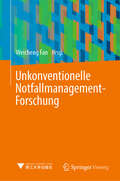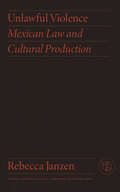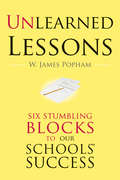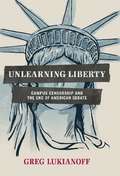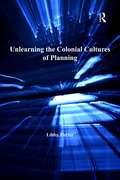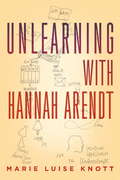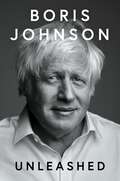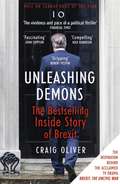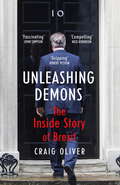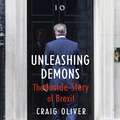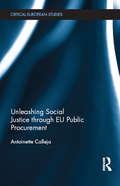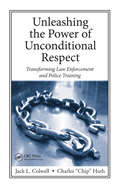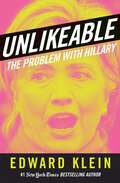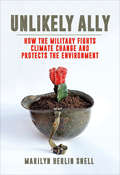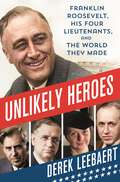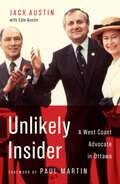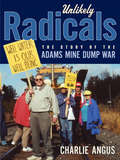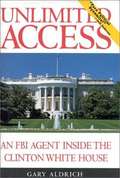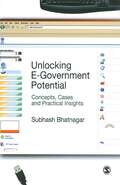- Table View
- List View
Unkonventionelle Notfallmanagement-Forschung
by Weicheng FanIn diesem Buch werden vor allem der Forschungsüberblick, die Forschungsergebnisse und die weiteren Perspektiven der "Unconventional Emergency Management Research" vorgestellt, einem großen Forschungsplan der National Natural Science Foundation of China (im Folgenden als Plan bezeichnet). Im Rahmen des Plans wurden innovative Forschungsarbeiten zu wichtigen strategischen Bereichen und Richtungen des Notfallmanagements durchgeführt. Insgesamt wurden 121 Projekte im Rahmen des Plans finanziert, darunter 92 Förderprojekte, 25 Schlüsselprojekte und 4 integrierte Projekte mit einer Gesamtfinanzierung von 120 Millionen RMB. Aus der Perspektive der wichtigsten nationalen Bedürfnisse und der Entwicklung wissenschaftlicher Disziplinen konzentriert sich das Buch auf drei wissenschaftliche Schlüsselthemen: Informationsverarbeitung und Evolutionsmodellierung unkonventioneller Notfälle, Theorie der Entscheidungsfindung in unkonventionellen Notfällen und psychologische und verhaltensbezogene Reaktionsgesetze von Individuen und Gruppen in Notfallsituationen. Die Veröffentlichung dieses Buches zielt darauf ab, die Forschung und Erkundung im Bereich der öffentlichen Sicherheit und des Notfallmanagements stärker zu unterstützen.
Unlawful Violence: Mexican Law and Cultural Production (Critical Mexican Studies)
by Rebecca JanzenViolence has only increased in Mexico since 2000: 23,000 murders were recorded in 2016, and 29,168 in 2017. The abundance of laws and constitutional amendments that have cropped up in response are mirrored in Mexico's fragmented cultural production of the same period. Contemporary Mexican literature grapples with this splintered reality through non-linear stories from multiple perspectives, often told through shifts in time. The novels, such as Jorge Volpi's Una novela criminal [A Novel Crime] (2018) and Julián Herbert's La casa del dolor ajeno [The House of the Pain of Others] (2015) take multiple perspectives and follow non-linear plotlines; other examples, such as the very short stories in ¡Basta! 100 mujeres contra la violencia de género [Enough! 100 Women against Gender-Based Violence] (2013), present perspectives from multiple authors. Few scholars compare cultural production and legal texts in situations like Mexico, where extreme violence coexists with a high number of human rights laws. Unlawful Violence measures fictional accounts of human rights against new laws that include constitutional amendments to reform legal proceedings, laws that protect children, laws that condemn violence against women, and laws that protect migrants and Indigenous peoples. It also explores debates about these laws in the Mexican house of representatives and senate, as well as interactions between the law and the Mexican public.
Unlearned Lessons: Six Stumbling Blocks to Our Schools' Success
by W. James Popham""Why is it," writes noted assessment expert W. James Popham, "that today's educators seem almost compelled to replicate their predecessors' blunders?" Looking back over a career of more than fifty years in education, Popham identifies six key "unlearned lessons" in education and reflects on their impact on schools, teachers, and students. In an account enlivened by personal anecdotes and the unique perspective gained from long experience, he shows how each of these six mistakes has persisted over time, gives examples of encounters with these mistakes in the course of his professional career, and points the way toward straightforward solutions. This lucid and powerful book belongs on the bookshelf of anyone interested in the history of education and the intersection between assessment, policy, and instruction." Notable Education Book of 2009, American School Board Journal
Unlearned Lessons: Six Stumbling Blocks to Our Schools' Success
by W. James Popham2010 Notable Education Book, American School Board Journal "&“Why is it,&” writes noted assessment expert W. James Popham, &“that today&’s educators seem almost compelled to replicate their predecessors&’ blunders?&” Looking back over a career of more than fifty years in education, Popham identifies six key &“unlearned lessons&” in education and reflects on their impact on schools, teachers, and students. In an account enlivened by personal anecdotes and the unique perspective gained from long experience, he shows how each of these six mistakes has persisted over time, gives examples of encounters with these mistakes in the course of his professional career, and points the way toward straightforward solutions. This lucid and powerful book belongs on the bookshelf of anyone interested in the history of education and the intersection between assessment, policy, and instruction."
Unlearning Liberty
by Greg LukianoffFor over a generation, shocking cases of censorship at America's colleges and universities have taught students the wrong lessons about living in a free society. Drawing on a decade of experience battling for freedom of speech on campus, First Amendment lawyer Greg Lukianoff reveals how higher education fails to teach students to become critical thinkers: by stifling open debate, our campuses are supercharging ideological divisions, promoting groupthink, and encouraging an unscholarly certainty about complex issues.Lukianoff walks readers through the life of a modern-day college student, from orientation to the end of freshman year. Through this lens, he describes startling violations of free speech rights: a student in Indiana punished for publicly reading a book, a student in Georgia expelled for a pro-environment collage he posted on Facebook, students at Yale banned from putting an F. Scott Fitzgerald quote on a T shirt, and students across the country corralled into tiny "free speech zones" when they wanted to express their views.But Lukianoff goes further, demonstrating how this culture of censorship is bleeding into the larger society. As he explores public controversies involving Juan Williams, Rush Limbaugh, Bill Maher, Richard Dawkins, Larry Summers-even Dave Barry and Jon Stewart-Lukianoff paints a stark picture of our ability as a nation to discuss important issues rationally. Unlearning Liberty: Campus Censorship and the End of American Debate illuminates how intolerance for dissent and debate on today's campus threatens the freedom of every citizen and makes us all just a little bit dumber.
Unlearning the Colonial Cultures of Planning
by Libby PorterColonialization has never failed to provoke discussion and debate over its territorial, economic and political projects, and their ongoing consequences. This work argues that the state-based activity of planning was integral to these projects in conceptualizing, shaping and managing place in settler societies. Planning was used to appropriate and then produce territory for management by the state and in doing so, became central to the colonial invasion of settler states. Moreover, the book demonstrates how the colonial roots of planning endure in complex (post)colonial societies and how such roots, manifest in everyday planning practice, continue to shape land use contests between indigenous people and planning systems in contemporary (post)colonial states.
Unlearning with Hannah Arendt
by Marie Luise KnottShort-listed for the Tractatus Essay Prize, an examination of the innovative strategies Arendt used to achieve intellectual freedom After observing the trial of Adolf Eichmann, Hannah Arendt articulated her controversial concept of the "banality of evil," thereby posing one of the most chilling and divisive moral questions of the twentieth century: How can genocidal acts be carried out by non-psychopathic people? By revealing the full complexity of the trial with reasoning that defied prevailing attitudes, Arendt became the object of severe and often slanderous criticism, losing some of her closest friends as well as being labeled a "self-hating Jew." And while her theories have continued to draw innumerable opponents, Arendt's work remains an invaluable resource for those seeking greater insight into the more problematic aspects of human nature. Anchoring its discussion in the themes of translation, forgiveness, dramatization, and even laughter, Unlearning with Hannah Arendt explores the ways in which this iconic political theorist "unlearned" recognized trends and patterns--both philosophical and cultural--to establish a theoretical praxis all her own. Through an analysis of the social context and intellectual influences--Karl Jaspers, Walter Benjamin, and Martin Heidegger--that helped shape Arendt's process, Knott has formed a historically engaged and incisive contribution to Arendt's legacy.
Unleashed
by Boris JohnsonShattering the mold of the traditional political memoir, Unleashed is a candid, unrestrained, and revealing book by Boris Johnson, the Former Prime Minister of the United Kingdom. In Unleashed, Johnson takes readers through all the big decisions during his time in power and why he took them. The challenges and crises, how they were resolved—or not—and how he nearly died from Covid; riots; crime; the London Olympics, and so much more. Johnson writes about his role in Brexit and the constitutional sea-change in British politics in 2019 with his landslide election victory.Underlying everything in the book is Johnson's belief that the UK is an extraordinary country and should have an exceptional future. Unleashed stands out as a rare glimpse into the inner workings of leadership at the highest levels of power.
Unleashing Demons: The Inside Story Of Brexit
by Craig OliverAs David Cameron's director of Politics and communications, Craig Oliver was in the room at every key moment during the EU referendum - the biggest political event in the UK since World War 2.Craig Oliver worked with all the players, including David Cameron, George Osbourne, Barack Obama, Angela Merkel, Jeremy Corbyn, Boris Johnson,Michael Gove, Theresa May and Peter Mandelson.Unleashing Demons is based on his extensive notes, detailing everything from the decision to call a referendum, to the subsequent civil war in the Conservative Party and the aftermath of the shocking result.This is raw history at its very best, packed with enthralling detail and colourful anecdotes from behind the closed doors of the campaign that changed British history.
Unleashing Demons: The Inside Story of Brexit
by Craig OliverMAIL ON SUNDAY BOOK OF THE YEAR'ESSENTIAL' Sunday Times'HIS SOLDIER'S DISPATCH IS EASY TO READ AND VIVIDLY ILLUSTRATES A SENSE OF RISING PANIC AND EMBATTLEMENT. IF YOU WANT TO KNOW WHAT IT WAS LIKE TO BE THERE AT THE TIME, IN THE EYE OF A FRENZIED STORM, THEN [UNLEASHING DEMONS] SHOULD BE BOUGHT...' Andrew Marr, Sunday Times'VIVID AND IMMEDIATE... IT PAINTS A BRUTALLY HONEST PORTRAIT OF THE BRITISH POLITICAL CLASS' Mail on SundayOBSERVER BOOK OF THE WEEK'A MUST-READ ACCOUNT OF HISTORY AS IT HAPPENED' Matt D'Ancona'JAUNTILY WRITTEN...NAUGHTY FUN' Quentin Letts'UNLEASHING DEMONS...HAS THE VIVIDNESS AND PACE OF A POLITICAL THRILLER. EXTRAORDINARILY CANDID...' Financial Times'A FASCINATING BOOK' Robert Elms, BBC'THE BOOK THAT WILL SET WESTMINSTER ABLAZE' Mail on Sunday'Gripping reading' New Statesman'Utterly fascinating...indispensable to appreciating this extraordinary phase in our history.' JOHN SIMPSON'The compelling insider's account' NICK ROBINSON'This is one of the most vivid, frank and exciting inside accounts to have been written for years.' ANTHONY SELDON'A gripping fly-on-the-wall account.' ROBERT PESTONAs David Cameron's director of Politics and communications, Craig Oliver was in the room at every key moment during the EU referendum - the biggest political event in the UK since World War 2.Craig Oliver worked with all the players, including David Cameron, George Osbourne, Barack Obama, Angela Merkel, Jeremy Corbyn, Boris Johnson, Michael Gove, Theresa May and Peter Mandelson.Unleashing Demons is based on his extensive notes, detailing everything from the decision to call a referendum, to the subsequent civil war in the Conservative Party and the aftermath of the shocking result.This is raw history at its very best, packed with enthralling detail and colourful anecdotes from behind the closed doors of the campaign that changed British history.
Unleashing Demons: The Inside Story of Brexit
by Craig Oliver'Utterly fascinating...I suspect that every historian of the period will regard it as indispensable to appreciating this extraordinary phase in our history.' John Simpson 'The compelling insider's account of the man who was at the centre of the Downing Street web' Nick Robinson'This is one of the most vivid, frank and exciting inside accounts to have been written for years.' Anthony Seldon'A gripping fly-on-the-wall account of the frenzy in Downing Street during the EU campaign.' Robert PestonAs David Cameron's director of Politics and communications, Craig Oliver was in the room at every key moment during the EU referendum - the biggest political event in the UK since World War 2.Craig Oliver worked with all the players, including David Cameron, George Osbourne, Barack Obama, Angela Merkel, Jeremy Corbyn, Boris Johnson, Michael Gove, Theresa May and Peter Mandelson.Unleashing Demons is based on his extensive notes, detailing everything from the decision to call a referendum, to the subsequent civil war in the Conservative Party and the aftermath of the shocking result.This is raw history at its very best, packed with enthralling detail and colourful anecdotes from behind the closed doors of the campaign that changed British history.(P) 2016 Hodder & Stoughton
Unleashing Demons: The inspiration behind Channel 4 drama Brexit: The Uncivil War
by Craig OliverTHE INSPIRATION BEHIND CHANNEL 4 DRAMA STARRING BENEDICT CUMBERBATCH - BREXIT: THE UNCIVIL WARMAIL ON SUNDAY BOOK OF THE YEAR OBSERVER BOOK OF THE WEEK'A compelling book' Evening Standard 'Essential' Sunday Times 'His soldier's dispatch is easy to read and vividly illustrates a sense of rising panic and embattlement. If you want to know what it was like to be there at the time, in the eye of a frenzied storm, then [Unleashing Demons] should be bought...' Andrew Marr, Sunday Times 'Vivid and immediate...It paints a brutally honest portrait of the British political class' Mail on Sunday 'A must-read account of history as it happened' Matt D'Ancona 'Jauntily written...naughty fun' Quentin Letts 'Unleashing Demons...has the vividness and pace of a political thriller. Extraordinarily candid...' Financial Times 'A fascinating book' Robert Elms, BBC 'The book that will set Westminster ablaze' Mail on Sunday 'Gripping reading' New Statesman 'Utterly fascinating...indispensable to appreciating this extraordinary phase in our history.' John Simpson 'The compelling insider's account' Nick Robinson 'This is one of the most vivid, frank and exciting inside accounts to have been written for years.' Anthony Seldon 'A gripping fly-on-the-wall account.' Robert Peston As David Cameron's director of Politics and communications, Craig Oliver was in the room at every key moment during the EU referendum - the biggest political event in the UK since World War 2. Craig Oliver worked with all the players, including David Cameron, George Osbourne, Barack Obama, Angela Merkel, Jeremy Corbyn, Boris Johnson, Michael Gove, Theresa May and Peter Mandelson. Unleashing Demons is based on his extensive notes, detailing everything from the decision to call a referendum, to the subsequent civil war in the Conservative Party and the aftermath of the shocking result. This is raw history at its very best, packed with enthralling detail and colourful anecdotes from behind the closed doors of the campaign that changed British history.
Unleashing Social Justice through EU Public Procurement (Critical European Studies #2)
by Antoinette CallejaThe dramatic results of the 2014 European Parliament elections have highlighted the European Union’s urgent need for a review of the scope and purpose of its social objectives and for a reordering of European priorities. This book advocates a radical and original alternative to the current philosophy that determines the set of rules for the awarding of EU public procurement contracts. It calls for a reordering of the EU’s economic and social priorities. In doing so, it advocates for a social dimension to be placed at the core of public procurement, which could elicit a social model of integration in the EU in which the European citizen is the key actor. This is achieved through an analytical approach as well as concise and contextualised explanations relating to free trade theories, poverty and public interest theories. This book will be of key interest to students and scholars of the European Union, political theory, and EU law.
Unleashing the Power of European Innovation: How Government, Industry and Science Share Knowledge to Overcome Global Challenges
by Fred BakkerThe world is at a critical juncture where our industrial and economic principles have to be reshaped. Three major transitions are underway: towards the use of alternative energy sources, towards carbon-neutral and sustainable production, and towards digitalised manufacture and distribution. This book explores the ways in which these transitions are taking place in Europe.No single institution can bring about the necessary changes: a productive cooperation between government, industry and (technological) knowledge centres has to be established. In this insightful book, Fred Bakker paints a vivid picture of a wide range of European businesses, industries and research institutes, joining forces to further the transitions. This process of ‘Sharing Brainpower’ proves to be a unique European strength that needs to be recognised and furthered.Structured in five parts, the book provides a thumbnail sketch of Europe’s goals and methods, through a bird’s eye view across current initiatives towards the three transitions, to a concluding part in which the workings of Sharing Brainpower are described in terms of a set of ‘lessons learned’. It shows how top-down initiatives and the bottom-up approach reinforce one another, with case stories that prove that diversity does not have to mean fragmentation; it is a source of strength.Policymakers, industry advisers, board members, chief innovation officers and students will find much to inspire them and their work in this book.A website with cases, updates and more information is available at sharingbrainpower.eu.
Unleashing the Power of Unconditional Respect: Transforming Law Enforcement and Police Training
by Jack Colwell Charles HuthEvery day, police officers face challenges ranging from petty annoyances to the risk of death in the line of duty. Coupled with these difficulties is, in some cases, lack of community respect for the officers despite the dangers these men and women confront while protecting the public. Exploring issues of courage, integrity, leadership, and charact
Unlikeable: The Problem with Hillary
by Edward KleinA New York Times Bestseller! From the author of the #1 New York Times bestsellers The Amateur and Blood Feud . . . <P><P>Unlikeable is the stunning, powerful exposé of Hillary Clinton and her floundering race for the White House. With unprecedented access to longtime associates of the Clintons and the Obamas, investigative reporter Edward Klein meticulously recreates conversations and details of Hillary Clinton's behind-the-scenes plotting in Chappaqua and Whitehaven. <P><P>Klein, the former editor in chief of New York Times Magazine and a contributing editor to Vanity Fair, draws a deeply troubling portrait of Hillary Rodham Clinton, a highly unlikeable presidential candidate and a woman more associated with scandal than with accomplishments, with lying than with truth, with arrogance than with compassion.
Unlikely Ally: How the Military Fights Climate Change and Protects the Environment
by Marilyn Berlin SnellAn environmental journalist reveals how some California military bases are leading the charge in the fight against climate change. In California, the US military has begun to redefine how our national security operations relate to the destabilizing effects of climate change. Several bases have taken on a largely unrecognized yet crucial role in renewable-energy innovation and in preserving cultural and natural treasures. These facilities are going beyond environmental stewardship to align national defense with energy security and the protection of endangered species. In Unlikely Ally, environmental journalist Marilyn Berlin Snell takes readers through these bases to examine what twenty-first-century sustainable-energy infrastructure looks like; whether combat readiness and species protection can successfully coexist; how cutting-edge technology and water-conservation practices could transform life in a resource-constrained world; and how the Department of Defense's scientific research into the metabolic secrets of the endangered desert tortoise could speed human travel to Mars.
Unlikely Heroes: Franklin Roosevelt, His Four Lieutenants, and the World They Made
by Derek Leebaert"Propulsive." —The Wall Street Journal“Leebaert has done the near impossible—crafted a fresh and challenging portrait of the man and his inner circle.”— Richard Norton Smith, author of An Uncommon Man, former director of the Hoover, Eisenhower, Reagan, and Ford presidential libraries.“A fascinating and absorbing analysis of FDR’s brilliantly chosen team of four courageous and creative men and women.”—Susan Dunn, author of 1940: FDR, Willkie, Lindbergh, Hitler—the Election Amid the Storm, Massachusetts Professor of Humanities, Williams College.Drawing on new materials, Unlikely Heroes constructs an entirely fresh understanding of FDR and his presidency by spotlighting the powerful, equally wounded figures whom he raised up to confront the Depression, then to beat the Axis.Only four people served at the top echelon of President Franklin Roosevelt's Administration from the frightening early months of spring 1933 until he died in April 1945, on the cusp of wartime victory. These lieutenants composed the tough, constrictive, long-term core of government. They built the great institutions being raised against the Depression, implemented the New Deal, and they were pivotal to winning World War II.Yet, in their different ways, each was as wounded as the polio-stricken titan. Harry Hopkins, Harold Ickes, Frances Perkins, and Henry Wallace were also strange outsiders. Up to 1933, none would ever have been considered for high office. Still, each became a world figure, and it would have been exceedingly difficult for Roosevelt to transform the nation without them. By examining the lives of these four, a very different picture emerges of how Americans saved their democracy and rescued civilization overseas. Many of the dangers that they all overcame are troublingly like those America faces today.
Unlikely Insider: A West Coast Advocate in Ottawa
by Jack AustinAt a time when too many of the world’s political leaders are consolidating power by playing on divisions and stoking fear, Unlikely Insider, a memoir by former federal cabinet minister and senator Jack Austin, comes as a welcome reminder of the value of public service as a force for economic progress, social justice, and nation-building.With both historical perspective and an eye to the future, Austin reflects on events and people whose impacts are still felt, and on the enduring challenges of Canadian life. Moving away from colonial domination of Indigenous Peoples, navigating our pivotal relationship with the United States and engagement with China, the nature and purpose of the Senate: these remain timely concerns, to which Austin has made significant contributions. Sharing insights into policy as well as into the personalities of colleagues and friends, Unlikely Insider paints vignettes of figures from Premier Zhou Enlai to Queen Elizabeth and recounts the author’s travels with Pierre Trudeau after the prime minister’s retirement. As a British Columbian, Austin worked to ensure that his province’s perspectives and interests mattered in Ottawa; as someone who came from a disadvantaged background, he is sensitive to the need to make the country a place of fairness and opportunity for all. Unlikely Insider reminds Canadians that inclusion – regional, social, and demographic – makes our nation both stronger and more just.
Unlikely Partners
by Julian GewirtzWith Deng Xiaoping’s blessing, Mao’s successors scoured the globe for fresh ideas to launch domestic prosperity and global economic power. Yet China’s government did not publicize its engagement with Western-style innovations, claiming instead that economic reinvention was the Party’s achievement alone. Julian Gewirtz sets forth the truer story.
Unlikely Partners?: China, the European Union and the Forging of a Strategic Partnership (Governing China in the 21st Century)
by Zhongqi Pan Anna MichalskiThis book provides an in-depth analysis of the relations between China and the EU, tracing the development of this complex, yet intriguing, relationship between two substantially different actors. To uncover a deeper understanding of this unlikely partnership, the authors analyze the partnership through the prism of contending norms and worldviews. The China-EU strategic partnership has evolved through fits and starts but despite continuous trade disputes and severe diplomatic misunderstandings, the EU and China pledge to uphold, even deepen, the partnership. Policy experts and scholars will learn how such contending bilateral relationships can be managed and establish a better understanding of deep-seated conceptual differences between these two entities.
Unlikely Radicals: The Story of the Adams Mine Dump War
by Charlie AngusFor twenty-two years politicians and businessmen pushed for the Adams Mine landfill as a solution to Ontario’s garbage disposal crisis. This plan to dump millions of tonnes of waste into the fractured pits of the Adams Mine prompted five separate civil resistance campaigns by a rural region of 35,000 in Northern Ontario. Unlikely Radicals traces the compelling history of the First Nations people and farmers, environmentalists and miners, retirees and volunteers, Anglophones and Francophones who stood side by side to defend their community with mass demonstrations, blockades, and non-violent resistance.
Unlimited Access: An FBI Agent Inside the Clinton White House
by Gary AldrichGary Aldrich served both Presidents Bush and Clinton in the White House as a private investigator whose task it was to check the backgrounds and character of the president's choices for top-level government positions. What he found will shock you. Throughout Unlimited Access, Aldrich relies on eyewitness testimony: his own, and that of other White House insiders. He shows the American public that the Clinton staff-characterized by arrogance and ignorance-as hostile to the military, the FBI, the CIA, and the Secret Service. Unlimited Access is an insider's electrifying expose of a presidential administration gone awry.
Unlimited Potential
by Muhammad Yunus Piotr DutkiewiczNobel Peace Prize winner Muhammad Yunus advocates in this interview for a model of social business that uses the market system to deliver solutions for social ills. Yunus, renowned for his work developing microcredit and microfinance through Grameen Bank, explains the need for an economic approach focused on human selflessness and offers a new way out of our current economic crises.
Unlocking E-Government Potential: Concepts, Cases and Practical Insights
by Subhash BhatnagarUnlocking E-Government Potential: Concepts, Cases and Practical Insights serves as a practical guide for conceptualizing and implementing e-government at the local, state and national levels and provides an overview of the global experience in implementing the same. This book is a sequel to the author′s earlier book, E-Government: From Vision to Implementation. It describes the evolution of e-government applications over a period of four years through cases and illustrations and explores its potential impact on cost of access, quality of service and quality of governance for citizens and businesses, and on transparency and corruption. The book presents empirical results from impact assessment studies done during 2006–08 for nearly 50 e-government projects. Among other issues, it discusses the strategy for making e-government work for the poor. The case studies of e-government applications cover a wide range—serving different types of clients, focusing on different purposes, and built by different tiers of government. These cases explain the application context, new approaches embodied in the e-government application, challenges faced during implementation, benefits delivered and costs incurred. This book will be of interest to management professionals and those with a public administration background. It will also be very useful for students enrolled in university programmes dealing with ICT and development and international academic courses on e-governance.
